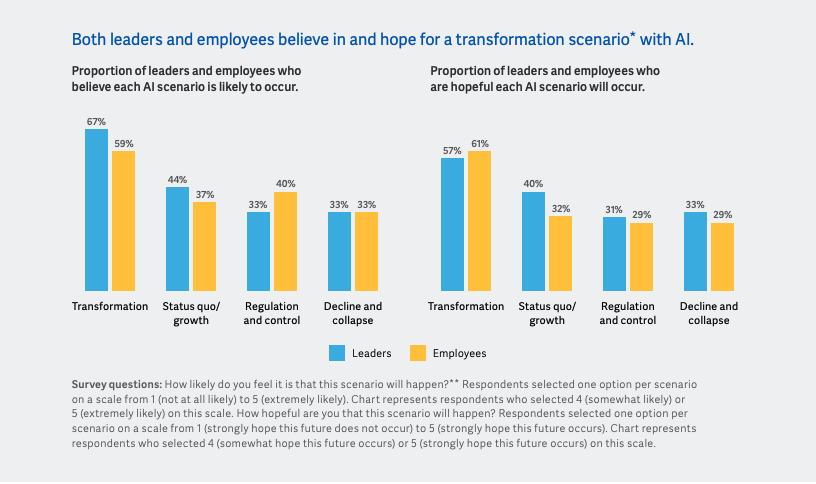
Is there an AI trust gap? Less than two-thirds of business leaders actually welcome AI, and this number is even lowers among employees.
Workday, Inc, a leader in enterprise cloud applications for finance and human resources, today published its latest global study, which found that an AI trust gap has formed in the workplace.
Business leaders and employees are in agreement that AI holds great opportunities for business transformation, however, there is a lack of trust that it will be deployed responsibly, with employees showing an even deeper level of scepticism than their leadership counterparts.
Below are some key findings that reflect workplace trends for the next 12 months and beyond.
AI trust gap at all levels of the workforce
When it comes to organisations adopting and deploying AI responsibly, there is a lack of trust at all levels of the workforce, particularly from employees. Only 62% of leaders welcome AI adoption in their organisation and the same percentage of leaders are confident their organisation will ensure AI is implemented in a responsible and trustworthy way. At the employee level, that number drops even further to 52% and 55% respectively.
There is also uncertainty among employees and leaders that their organisation will implement AI in the right way. 23% of employees are not confident their organisation puts employee interests above its own when implementing AI, and leaders agree: 21% of leaders report they are not confident their organisations will put employee interests first.
There is also certainty among employees and leaders that their organisation will implement AI in the right way. 23% of employees are not confident their organisation puts employee interests above its own when implementing AI, and leaders agree: 21% of leaders report they are not confident their organisations will put employee interests first.
Human intervention with AI
Leaders and employees want human involvement in AI processes, but are unclear on the best way to do so. 70% of business leaders agree AI should be developed in a way that easily allows for human review and intervention. But 42% of employees believe their company does not have a clear understanding of which systems should be fully automated and which require human intervention.
Earlier Workday-commissioned research on AI further validates concerns around companies’ abilities to implement AI responsibly and effectively: nearly three-quarters (72%) of leaders said their organisation lacks the skills to fully implement AI and ML, and an even slightly higher percentage (76%) said their own knowledge of AI and ML applications needs improvement.

Need for Smart AI Governance with Transparency
Asked to imagine a future where AI is a part of everyday life, 42% of leaders and 36% of employees cite organisational frameworks and regulation as most important for building trustworthy AI.
However, there is a lack of organisation-wide visibility around AI regulation and guidelines. Three in four employees say their organisation is not collaborating on AI regulation and four in five say their company has yet to share guidelines on responsible AI use.
Workday has launched this research as a lead up to the World Economic Forum Annual Meeting, taking place in Davos, Switzerland, from January 15-19, 2024.
---
For additional information:
- Download the report, Closing the AI Trust Gap.
- Check out the infographic, Closing the AI Trust Gap: Three Key Findings..
- Learn about Workday's approach to responsible AI governance here.
About the Report
This data comes from the global study “Closing the AI Trust Gap,” a survey commissioned by Workday and conducted by FT Longitude in November and December 2023. The survey encompassed 1,375 business leaders and 4,000 employees across 15 countries in three core regions: North America; Asia-Pacific and Japan (APJ); and Europe, the Middle East, and Africa (EMEA).
This breakdown reveals a comprehensive view of the organisational hierarchy, highlighting the perspectives of leadership and the broader employee population.















Comments ( 0 )